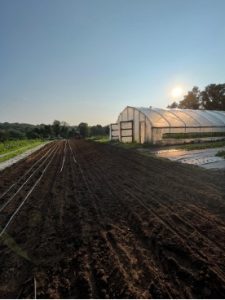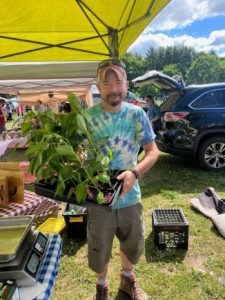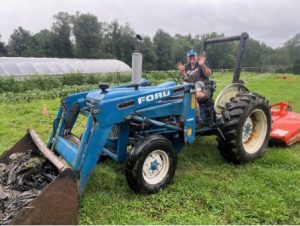By Jean Cardinale

“Farming is hard work.” As a volunteer farmers’ market manager for 20 years, I said that phrase countless times. I knew from talking to farmers each season that they were dedicated to bringing their products to the public each week, no matter what challenges they faced, and that fueled my pursuit to build a community around a successful farmers’ market for them. It became the basis for so much of the marketing I used to draw people in to experience the taste and quality of local vegetables and fruits, and to learn more about them as our neighbors. If it wasn’t for the abrupt end of my volunteer gig and the patience of Mitchel Colgan of Colgan Farm in Lebanon, CT, I would never have had the opportunity to explore farming from the farmers’ side of the vendor table to understand how hard, and rewarding, it really is.
Physically Demanding
Farming is hard both physically and mentally. Physically, my body was not prepared for what was necessary. Picking inside the greenhouses that reach over 100 degrees, never thinking the warm summer breeze would feel refreshing. Kneeling in the prickly cucumber bed and doing ‘cucumber yoga’ as Mitchel called it, to reach the other side of the vines without stepping on the crop. Back-breaking bending over down a 100 foot row to harvest carrots, onions, cabbage, and kale, only to start the next one right after.
Mitchel would say one of the challenges is that the day never ends and he was right. When I’m at my desk job, I can close my laptop and leave the building, but farming doesn’t work that way. Even when your body is tired at the end of the week from picking fresh vegetables for the weekend farmers markets, there is still the need for rinsing, trimming, and preparing them so they look as good as the grocery store factory-like vegetables on the table. Then there is the packing it all into the cooler to stay fresh, packing it again into the truck on market morning, and doing it all in reverse after the three hour market. I moved a crate of heirloom tomatoes to get to one market six times in two days.

And the ‘days off’ at the beginning of the week? Turning over soil. Removing old and placing new plastic barriers before planting the next set of crops. Laying drip line to make sure they stay watered. Fixing fencing to keep the deer out of the squash. Weeding. Lots of weeding. Taking a road trip up north to buy more irrigation supplies. Designing and printing labels for the egg cartons. Rotating onions on the drying rack in preparation for winter markets. Finding a place for perishable products that didn’t sell at market. Posting on social media to market the business. The to-do list never ends and is often the responsibility of a single farmer.
Mentally Demanding
According to the American Farm Bureau, there has been recent acknowledgement and important work towards addressing mental health issues among the farming community. Multiple studies show farmer suicide rates are 2-5x higher than the national average.1 Factors outside of your control like weather and pests, financial uncertainty, and a solitary workplace are part of the issue. During my time in the fields, my journey started with the need to overcome uncomfortable feelings to embrace bugs I’ve never seen before and stare down an endless row of tomatoes with just my thoughts and wondering if I will ever get to the end of them. We had to hurry to pick while we watched the thunderstorm roll in, then get covered in a thin layer of dry dirt due to the lack of rain the next week. And that heat, without any shade, can take a toll on your mental state just as much as it does physically. Then the things I didn’t need to worry about, such as how much to plant without knowing what will grow well and what will sell? How busy will the markets be and how much to pick? Why is this year’s customers’ favorite beet crop coming in so small? How does that rabbit keep getting in to eat the peppers? And the solitude that can lay heavy when nobody else is in the field with you. Farming means long hours, sore muscles, late dinners, and social isolation.
At Market – Fruits of the Labor

Outside of learning farm chores, being on the other side of the table at the farmers’ market and selling instead of volunteering was both fascinating and rewarding. There were regular Colgan Farm customers, lots of them, which I contribute to both his high quality product and a personality that was welcoming and sincere. Both are important parts of his success. The single most warming example of this was a regular customer that brought homemade zucchini bread made from what she bought the week before. She even came back a few weeks later to give me, virtually a stranger, a special gluten free version when she learned I couldn’t eat the first.
I got to talk with regulars who loved their market, and others who were there for the first time. People asking about the vegetables and farming itself, including the challenges of his no spray practices. People eager to share their recipes and stories about their own home gardens. Kids using their money to buy carrots and broccoli and telling them the name of the chicken that lays that pretty blue egg. Honestly, this is where the solitude of the field is forgotten, and I would argue that I liked working behind the table for Colgan Farm more than my previous market manager role. Even with the customers who balked at the higher prices than the grocery store (which was challenging to hear if they knew what I went through to pick that cucumber), rainy market days where shoppers were limited, and those who thought I was a captive audience for their politics.
Farming Idealized
Trust me when I say it was not all doom and gloom though. Throughout the 20 years I volunteered running markets, I always loved to see and share the idyllic photos on the farm – sunsets, beautiful fields, bountiful and colorful crops. I stopped to take those photos all the time, cutting into my farm chores but they were even more stunning, and meaningful, when I grabbed them myself. I also learned to love the not so pretty photos of mud, rotten tomatoes, the makeshift tape bandaid for my blister, and other real pictures of farm life. I also got to eat vegetables as fresh as I ever had, a little dirty and all right from the field – a taste that is unmatched. I even learned a good weed from a bad weed, that I love fresh heirloom tomatoes, and that I am not too afraid to pick up a chicken to collect eggs. The experience I had and the photos I took along the way only strengthen the story I’ve been crafting for years – farming is a profession that is incredibly challenging, noble, and essential for us to support.
What am I hoping you take away from this? Support local farmers – at markets, roadside stands, CSAs, wherever they are. They are working hard through a lot of adversity to provide us all with the freshest and most beautiful harvests you’ll ever see.
Mitchel Colgan earned a Master’s Degree in Public Health from UConn in 2010, completed UConn Extension’s Master Gardener Program in 2012, and started Colgan Farm in 2013.
Jean Cardinale earned a Master’s Degree in Communication (2025) and Public Administration (2004) from UConn and started the Coventry Farmers’ Market for the Town of Coventry, where she volunteered until 2023.
Photos courtesy of Jean Cardinale.